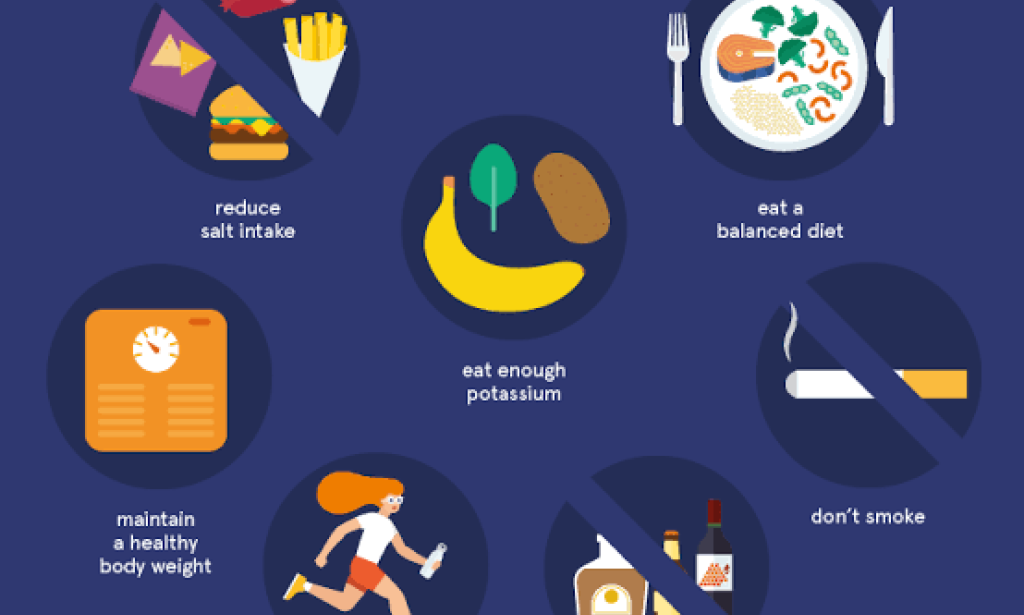1. Understanding Blood Pressure and Hypertension
Blood pressure measures the force of blood as it flows against the walls of arteries. When this force is consistently too high, it results in hypertension, a leading risk factor for heart disease and stroke. The American Heart Association (AHA) defines normal blood pressure as less than 120/80 mm Hg, with readings above this threshold categorized as elevated or hypertensive.
Hypertension is classified into two types:
- Primary (Essential) Hypertension: The most common type, with no identifiable cause but linked to lifestyle, diet, and genetics.
- Secondary Hypertension: A result of specific medical conditions like kidney disease, thyroid issues, or certain medications.
Although genetic predispositions and age-related changes are beyond control, several modifiable factors directly influence blood pressure levels.
2. Common Causes of High Blood Pressure
Hypertension often arises from a combination of factors, including:
- Underlying Health Conditions: Obesity, diabetes, and heart or kidney disorders are common contributors to secondary hypertension.
- Dietary Habits: High sodium intake is a significant cause of elevated blood pressure.
- Physical Inactivity: Lack of exercise weakens the heart and vascular system, increasing hypertension risk.
- Stress: Chronic stress can lead to temporary spikes in blood pressure that may develop into a long-term issue.
- Lifestyle Habits: Smoking and excessive alcohol consumption exacerbate blood pressure problems by damaging blood vessels and increasing arterial stiffness.
Understanding these causes can help individuals adopt healthier practices to mitigate risks.
3. Lifestyle Factors Influencing Blood Pressure
Lifestyle choices play a pivotal role in managing blood pressure. Key factors include:
- Diet: High-sodium diets are a primary culprit. The AHA recommends limiting daily sodium intake to 1,500-2,300 mg. Consuming potassium-rich foods like bananas, spinach, and sweet potatoes can counteract sodium's effects.
- Physical Activity: Regular exercise strengthens the heart, allowing it to pump blood more efficiently, thereby reducing pressure on arteries. Aim for at least 150 minutes of moderate activity per week.
- Smoking: Tobacco use temporarily raises blood pressure and causes long-term vascular damage. Quitting smoking has immediate and lasting health benefits.
- Sleep Hygiene: Inadequate sleep can worsen hypertension. Adults should aim for 7-9 hours of quality sleep nightly to maintain cardiovascular health.
These factors are within one’s control and can significantly improve both short- and long-term health outcomes.
4. Strategies for Managing and Preventing Hypertension
Preventing or managing hypertension often requires a combination of lifestyle adjustments and medical intervention. Strategies include:
- Maintaining a Healthy Weight: Losing even 2-3% of body weight can reduce blood pressure significantly.
- Stress Management: Techniques like meditation, deep breathing, or yoga can lower stress-induced blood pressure spikes.
- Alcohol Moderation: Excessive alcohol intake is linked to higher blood pressure levels. The AHA advises limiting consumption to one drink per day for women and two for men.
- Regular Monitoring: Keeping track of blood pressure readings allows for early detection and management.
- Collaboration with Healthcare Providers: Regular consultations can help create personalized plans and adjust medications if needed.
These actions not only lower blood pressure but also reduce risks of related complications like heart attacks and strokes.

5. The Role of Healthcare in Blood Pressure Management
Healthcare professionals play a critical role in diagnosing and managing hypertension. Regular check-ups, medication reviews, and counseling on lifestyle modifications are vital components of care.
Additionally, advances in technology, such as wearable blood pressure monitors and telemedicine consultations, make it easier for individuals to stay informed about their health and take proactive steps. Collaborative efforts between patients and healthcare providers can ensure sustained blood pressure control and improved quality of life.



You must be logged in to post a comment.